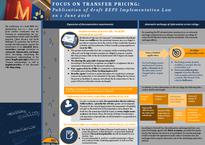
Draft BEPS Implementation Law
In particular, the draft law includes the following key aspects: the introduction of an extended documentation concept, provisions on automatic information exchange about tax-rulings, abandoning the international understanding of the arm's length principle in favor of a "German interpretation" as well as implementation of the discussed CbC-Reporting.
The topics reflect the main concerns of the draft BEPS Implementation Law: The law shall contribute to the reduction of existing information asymmetries of the financial authorities as well as to avoiding uncertainties relating the interpretation of existing double taxation agreements. Consequently, from a company perspective, this aim will lead to considerable additional compliance effort in the transfer pricing area.
The decision of the Federal Government to initiate the formal legislative shall take place on 13 July 2016. The conclusion of the legislative process is expected for the second half of 2016.
Expansion of documentation requirements
Implementation of master file / local file concept (§ 90 (3) AO)
Multinational "groups of companies" with turnover of at least Euro 100 million in the preceding business year are obliged to provide an overview about the nature of their worldwide business activities and the systematic of their transfer pricing regulations (master file).
- The present draft provides that also companies solely consisting of head office and one foreign business premise are obliged to prepare a master file. This provision follows the AOA (Authorized OECD Approach) implemented in 2013.
- Weakening the principle of proportionality?
According to the draft law, companies are obliged to complement the documentation if required by the financial authorities. - New approach in local file: Documentation of information at the time of transfer price setting (Price Setting Approach!)
- Breathe again! Contrary to public discussion of a mandatory contemporaneous documentation to be submitted at the time of filing the tax return, the previous deadlines to prepare and submit the documentation to the request of the tax authorities remain unchanged.
Further consequences: The draft announces a substantial revision of the Profit Allocation Documentation Regulation (GAufzV).
Tightening of sanctions regarding usability (§ 162 AO)
In case a company provides documentation that is substantially useless, a penalty fee of Euro 5,000 can be imposed. Pursuant to the current legal position the assessment of usability is based on the level of total documentation. According to the draft law, the assessment shall be based on every single transaction in the future. Thus, the breach of duties of cooperation and imposition of penalty fees would be linked to comparably low requirements.
No restrictive effect according to Art. 9 OECD-MA (§ 1 (1) AStG)
The draft rejects the Federal Finance Court’s notion, that income adjustments solely leading to a constructive dividend because of formal irregularities should be limited by convention law.
It is recommended to conduct a careful examination of form and content of rules of existing agreements as well as of the contractual basis.
Automatic exchange of information on tax rulings
By amending the EU administrative assistance law, an automatic exchange of information on advance cross-border tax rulings between the EU Member States shall be established. The automatic exchange affects:
- Time of initial application: For Tax Rulings concerning the period of 5 years prior 1 January 2017, the information are ex-changed before 1 August 2018.
- Deadline 31.12.2016
- Tax Rulings issued, decided, modified, or renewed after the 31 December 2016
- Exchanged without prior request of another Member State at regular intervals (within 3 months after the end of the calendar half-year).
In addition to basic information on the tax ruling also following information shall be exchanged:
- Personal details
- Summary of content
- Information basis (Request / Tax Ruling)
- Issue and period of validity
- Supposedly affected member states and individuals
- Amount of the transaction or series of transactions
- Type of Tax Ruling
- Criteria and procedures constituting the basis for TP determination
According to the draft law, the information exchange shall also comprise Tax Rulings agreed with third countries, provided that disclosure by the relevant tax treaty is not prohibited. In case the exchange would contradict the agreements made under Convention law, the exchange shall comprise information about the underlying application instead.
Interpretation of the arm’s length principle (§ 1 (1) AStG – new phrase 5)
- Interpretation of the arm's length principle contained in the double taxation agreements shall exclusively be based on German Foreign Transaction Tax Law (AStG).
- Current legal framework (Convention law): Evaluation is solely based on the criterion appropriateness of the transfer price and not primarily on its legal base. Deviations from this principle are only possible by means of a "treaty override”-rule which now shall be created by amendment of national law.
- Expected impact: Instead of original appropriateness of the transfer price, the economic conditions, under which cross-border transactions are conducted between related parties, will form the basis for an income adjustment. Thus, the discussion between financial administration and taxpayer during tax audits could focus on the "reason of concluding a contract" instead exclusively on appropriateness of the agreed prices.
- The proposed new § 1 (6) AStG creates a legal basis for the adoption of a so-called arm's length regulation, which is presumably demonstrating the authority’s notion about interpretation of the arm's length principle.
Obligatory submission of a Country-by-Country-Reporting (CbCR) (new § 138a AO)
In line with the recommendations of the OECD on BEPS Action Point 13, companies in Germany shall be obliged to submit a CbCR for business years starting 1 January 2016.
- Conditions: Domestic companies are obliged to submit the CbCR in Germany, if
- The consolidated financial statement comprises at least one foreign subsidiary or business premise,
- The consolidated turnover stated on the financial statement amounts to at least Euro 750 million in the preceding business year (in line with the OCED recommendations).
- Responsible company: The domestic group parent company is obliged to provide the CbCR. If the group parent company is resident in a foreign country and fails to submit the CbCR, the obligation of submission shall equally be transferred to every domestic subsidiary or business premise (Secondary Mechanism).
- In line with the OECD recommendations the CbCR obligatory comprises i.e. disclosures on revenues and other income, EBT (earnings before taxes), income taxes paid and subscribed capital as well as retained earnings.
Contemporaneous documentation: The CbCR shall be submitted to the Federal Central Tax Office no later than one year after the end of the relevant FY.

